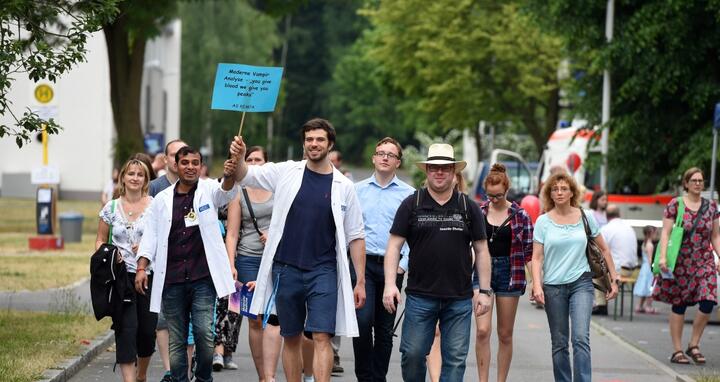That was the Long Night of Science 2015 on Campus Buch
At three in the afternoon, before the Long Night of Science even began, curious visitors already started venturing onto the campus. The smell of fresh crêpes and barbecue drifted from the food trucks together with live music across the green. The first lab tours of the MDC and FMP started at 4 p.m. Scientists in white lab coats waiting for their guests or walking across the campus with big signs quickly became a common sight.
In a tour called "Why coffee and stress could be life-threatening" the Golasch group from the Experimental and Clinical Research Center (ECRC) demonstrated how arteries contract when exposed to high dose of caffeine and explained why these findings are important to blood pressure research. The MDC's Daumke group explained how proteins work as molecular machines in the cell and how, with the help of crystals, x-rays and computers, they can make the 3D structures of protein molecules visible. At the FMP Dr. Jens Peter von Kries introduced visitors to the Screening Unit. At the tour "Robots and the search for the needle in the haystack: The beginning of finding drugs in the 21st century" he explained how state-of-the-art robots can test tens of thousands of substances for their effects in just a short space of time.
For all young visitors there was a lot to discover on the Campus. As in previous years, kids could take part in different activities to earn a "Forscherdiplom" (Researcher's Diploma). At eight participatory experiments, prepared by the Gläsernes Labor and pupils and teachers of the Robert-Havemann Gymnasium, kids could collect stamps to receive a personal certificate, the "Forscherdiplom", at the end. Their tasks included producing electricity from muscle power on the exercise bike; doing "magic" with chemistry; collecting objects from around the campus to study down the microscope and mixing their own herbal salt. In between times they could play and jump on a huge bouncy castle on the green.
From 5 p.m. the terrace behind the MDC.C. building was taken over by an examination of the science behind the headlines. "Stay critical" was the motto of the Speakers' Corner, held for the third time this year. Michael Strehle, MDC Neuroscience Program Manager, wondered if we are on our way to the perfect human thanks to CRISPR/Cas genome editing technology. André Lampe (Hauke Group, FMP) dedicated his talk to the world of science myths - from whether it's ok to pick up baby birds to the alleged visibility of the Great Wall of China from space. At about 8 p.m. the Speakers' Corner had to quickly move inside as a thunderstorm swept across Buch. But thankfully that didn't put off the audience for the last talk about Big Data in cancer research from Emanuel Wyler (Landthaler Group, MDC) - a big crown puller.
While the visitors took their last chance to see their own cells under the smartphone microscope and take a "Cellfie" at the "Hackers on campus" stand or check out the beating cardiomyocytes at "MDC under the magnifying glass", the MDC.C. was being prepared for the highlight of the evening: the Science Slam.
At precisely 21.30 the lights went off and the stage lights came up. Three young MDC scientists were each given 10 minutes to present the topic of their research in a vivid and entertaining way. After a warm-up slam by André Lampe about the connection between noisy children and the physics of microscopy, the show began. Lukas Pluska talked about ubiquitin as the waste-disposal service of the body; Andreas Offenbauer with a story about fluorescent, muscular worms including a firework display; and Carolin Schächtele talked about the short fingers of a turkish family, high blood pressure and Erdogans appetite for Döner. Afterwards the audience jury gave their score and proclaimed Andreas Ofenbauer the winner, followed by Lukas Pluska and Carolin Schächtele. Over a beer at the bar the remaining guests caught up on the events of the day. And because during the Long Night is also before the Long Night, we are already looking forward to next year's festivities - see you back here again on 11 June 2016!









